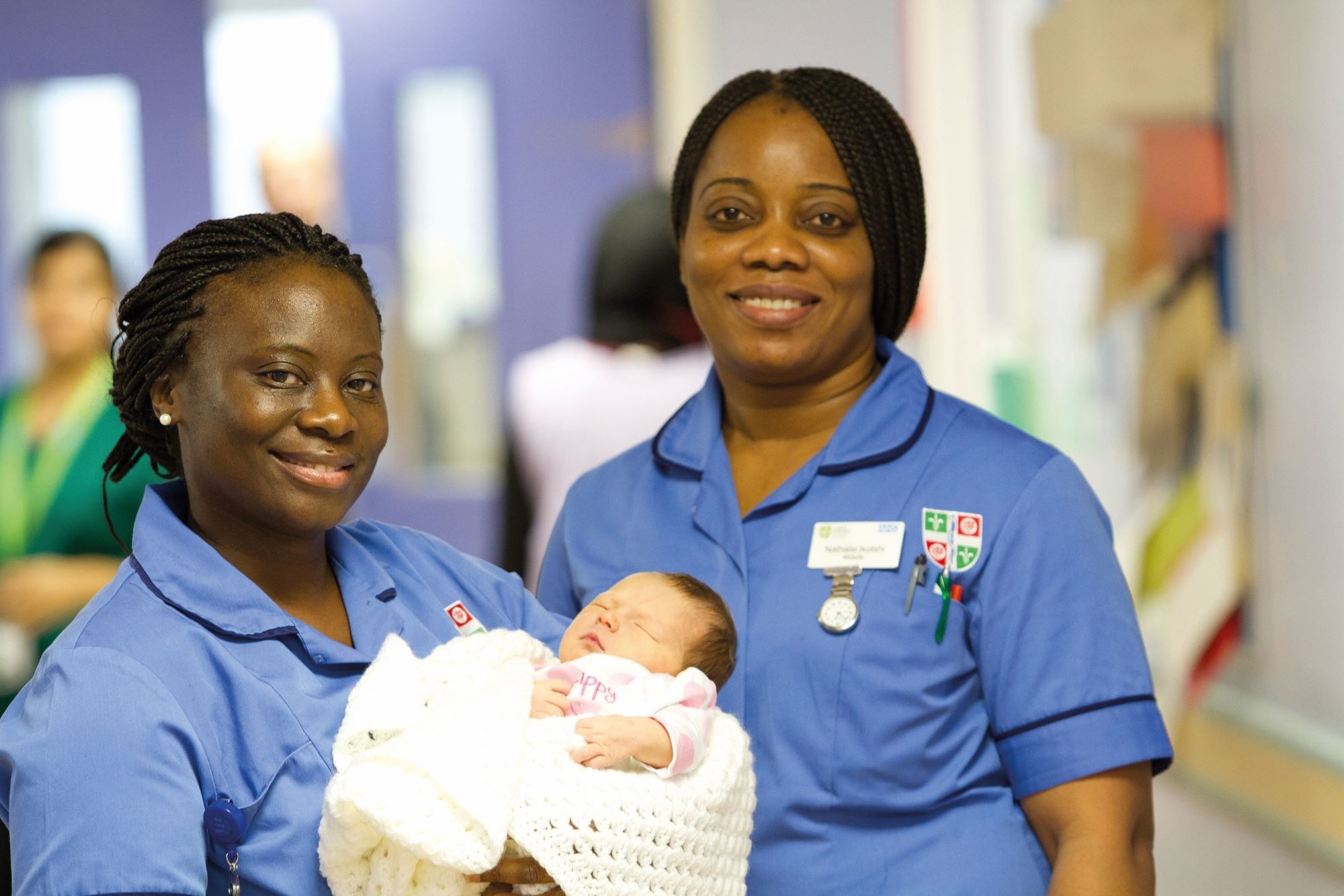How do we heal the NHS? Journalist and former midwife Pavan Amara asks health experts and staff

NHS midwife Piroska Cavell was in the middle of her night shift and caring for a woman in labour when she realised that she couldn’t move her mouth. Alone in a hospital room, she was physically unable to call for help. By a lucky twist of fate, a colleague came into the room at that moment and recognised the signs of a stroke. She shouted for the senior midwife in charge of the shift. “She [the senior midwife] came in, saw that I couldn’t move my face or speak, and said, ‘Yeah, we haven’t got another midwife to cover you, so you’ll just have to stay. Get on with it.’’’ Later on, blood poured from Cavell’s nose, and she developed a severe headache. After her shift, when she was finally able to see a doctor, she was told she had experienced a transient ischemic attack, or mini stroke.
“If you talk to people who have never worked in the health service, they have no idea that it’s a lot like the army,” says Cavell. “It’s a tough place, everyone is in survival mode and you’re surrounded by suffering, death and emergency. I find it funny when I hear people talk as if it’s this place of kindly soft-spoken angels. A lot of people have that assumption. When they need NHS care and they experience the toxicity and poor care, it’s a shock.”
Over the past decade, the Morecambe Bay report, the Ockenden review, the Kirkup report and the trial of Lucy Letby, to name a few of the biggest events, have chipped away at that angelic public perception. Page after page has outlined the unnecessary deaths, failings in care, and a lack of transparency. Now the Birth Trauma Inquiry report becomes the latest in that long list. Published in May by the all-party parliamentary group that investigated the issue, the 80-page document draws on oral and written submissions from thousands of women who recall being mocked, shouted at, ignored and left in bloodstained sheets while cared for by NHS maternity services.
Notably, one phrase springs up across all the reports – it is “NHS culture” – and is too often prefixed with the words “toxic” or “bullying”. About a quarter of the way in, the Birth Trauma Inquiry report echoes these words too. It also says this: “The overwhelming majority of written submissions [from women about NHS maternity services] referred to a lack of kindness or compassion on the part of the health professionals looking after them.”
At first glance this makes no sense. NHS services are made up of doctors, nurses, midwives and more – all people who, at some point, made the decision to dedicate their lives to caring for others. So, how can a toxic or bullying culture take hold of them?
“There’s a link between the way staff are treated and the way patients are,” says Cavell. “The hardness starts backstage. If you’re caught showing compassion or empathy to anyone, you’re seen as weak … kindness doesn’t fit that, and that tough behind-the-scenes culture will creep onto the floor [where patients are being cared for].”
To illustrate this, she recalls a shift when her colleague, a new midwife, collapsed on the labour ward. “It happened in the nurses’ station [a central meeting point on a ward for all staff],” says Cavell. “The midwife-in-charge shouted at her while she was passed out on the floor: ‘Get up, what’s your fucking problem?’ … It turned out she was having a miscarriage, and after [the midwife-in-charge] found that out, she said ‘Yeah, well, it’s over now, get back to work.’ If you’re doing that with your colleague – someone you know – how is a stranger who is miscarrying going to be treated? The same lack of empathy is going to exist.”
Why do toxic behaviours develop?
Although Cavell’s stories are anecdotal, the NHS’s own staff survey from last year shows that nearly one third of respondents felt bullied, harassed or abused by a manager or colleague in the last 12 months alone. Separately, around the same number say they feel exhausted just by the thought of another shift. Nearly 35 per cent also find their work emotionally exhausting and frustrating.
These statistics may hint at why negative behaviours develop among some NHS staff, but do not explain the level of unkindness reported to the Birth Trauma Inquiry. “I was told by one of the consultants to stop crying and calm down [after my baby was stillborn],” recalled one woman. “His words were, ‘This baby was dead a long time ago anyway so you should stop stressing over it’.”
Nothing can explain away that lack of compassion, but knowing who chooses NHS careers is a possible first step in understanding why the culture can turn toxic, says Jayne Ellis. She was a diabetes specialist nurse for three decades, but since 2010, she has delivered emotional health and safety workshops to thousands of staff across 85 NHS Trusts. “There is an assumption that everyone goes into the NHS because it’s a calling,” she says. “That’s not realistic. Broadly speaking, I’ve noticed that staff tend to come from four groups.”
The majority group working in the NHS, says Ellis, are people raised in families that value responsibility and a strong work ethic, and often have relatives working in the public sector. The second group tend to have a personal connection to the health service, like a close relative who was cared for, and the third group do simply have a calling to help others. The final group, she adds, does it for status and their driving force is a sense of self-importance.
“Other than the status group, all the others need things that aren’t available in today’s NHS,” she says. “Group one values responsibility at home as well as work, so they will want to be earning enough to support themselves and their family, and they’re not. Groups two and three say they need to be providing a high level of care to patients. They can’t, because of short staffing and under-resourcing. Eventually, these people will either leave or become disengaged. That leaves the status group. They won’t leave because being a health professional still provides a sense of importance over patients. They’re also hungry to climb the ladder. You can see how the culture change happens – [the status group] stay and reach higher, whereas the others don’t.”
Disconnecting from the job
There are also other more general factors that contribute to toxic cultures among health professionals, according to Ellis. Compassion fatigue and moral injury play their part. The former term was first coined by British psychologist Professor Carole Joinson to describe the emotional cost of caring for others who are in psychological and physical pain. Different from burnout, which can come from general stress, compassion fatigue derives from dealing with the trauma of others regularly. The warning signs include reduced feelings of empathy, feeling emotionally disconnected, and increased conflict in personal relationships.
Although there is no sole cause of compassion fatigue, there is a positive correlation between it and moral distress, the latter being defined as not having the means to do the right thing, despite knowing what the right thing is.
“The majority of today’s NHS frontline wants to do the right thing, but doesn’t have the means to do it,” says Ellis. “That’s due to short staffing, a lack of equipment and beds – the list goes on. Situations that lead to moral distress occur on every shift, and then what happens? You start seeing the signs of compassion fatigue: people switching off, not being able to emotionally engage, not just with patients but with their colleagues too. You can’t separate what’s been done to the NHS over the last decade and the culture.”
Between 2015/16 and 2022/23, government spending on the NHS increased by 2.8 per cent per year on average and in real terms, but this also included much-needed increased investment during the Covid pandemic. Despite the spending, in September 2023, the health service had approximately 121,000 full-time roles that needed to be filled. Furthermore, nearly half of all English hospitals were using outdated medical equipment, for example, x-ray machines that dated back to the 1980s.
“How do you cope when you’re surrounded by pain and death, you can’t leave, and you lack the resources to help?” says Ellis. “You shut down. That’s when places start to feel like ghost towns. The staff are physically there, but it’s like no-one’s home.”
The impact of witnessing the physical and emotional mess of death, birth and everything in between on a daily basis is rarely understood by either management or the public, Ellis adds.
“Health staff talk about the problems, but it’s abstract to most people,” she says. “People equate it to their own job, which might be at a desk, or a single experience they’ve had rather than a continuous thing. The things you see, smell, the touch of that person’s skin, the things you hear in someone’s final moments, the things you feel, that’s not easy to get across. It’s going to change you when you do that year after year. You can’t be the same person as when you entered into it.”
Leadership and perverse rewards
Dr Amy Attwater has worked in emergency care for 11 years and says that a fear of speaking out about it only drives the health service’s toxic culture. Ironically, and perhaps proving her point, Attwater – an A&E registrar working in the West Midlands – is the only doctor who agreed to talk about the issue with their name on the record. Although many current NHS staff members wanted to be interviewed openly for this piece, their contracts stipulate that a line manager and the NHS Trust’s press office must authorise it first. “A lot of doctors will be scared to talk [publicly] because their supervisors will find out, then there will be repercussions at work and their training will be affected,” she says. This means they are unlikely to smoothly progress to more senior roles. “I think it’s best to speak the truth though,” she adds.
Dr Attwater says that women’s submissions to the Birth Trauma Inquiry report did not shock her. Many of them “rang true” because she herself had a similar experience when in labour. She flags up poor leadership as a possible root cause of toxic culture. “It’s not everyone [in the NHS],” she says. “It tends to be those in senior positions and that toxicity works its way down the system.” NHS nurses, midwives, doctors and physiotherapists I spoke to who wish to remain anonymous all agree with her comment. They add that the way health service managers are sometimes chosen is a concern.
“Everyone else was leaving and she was the only one left,” says a midwife at a London NHS Trust, of a colleague promoted to leading a community team. A nurse at a different London NHS Trust said of another promotion, “She [a nurse] was always getting complaints from patients, so they wanted her in an office away from them.” It is difficult to get rid of NHS staff and it can be easier to promote people who are deemed clinically incompetent. Although good managers exist, Dr Attwater confirms that such cases do occur. “It’s very much a top-down structure,” she says. “People have to meet targets and certain criteria. It’s easy to forget about the patient.”
The health service is a complex place, struggling against many issues, Dr Attwater says. For example, some of the examples cited in the Birth Trauma Inquiry report can be explained by understaffing, rather than a lack of compassion. On a positive note, Attwater thinks students training for health jobs are “hopeful and enthusiastic”. Describing her own labour experience she says “the doctors and midwives seemed distant from me, everything was matter of fact”, but the the student midwife “got everything right”. However, she says that this attitude tends to change after students qualify and progress in their careers. “The students I’ve seen go into it for the right reasons, but it doesn’t take long for moral distress to occur, and then compassion fatigue, and that affects how they start to view patients.”
She describes a vicious cycle of bullying behaviour that starts high up. NHS England acknowledges that leadership will impact organisational culture, and research links leadership to the quality of patient care and hospital performance, but this is not always enough to change things on the ground.
Changing the culture
Peter Ellis was an NHS nurse for 14 years, then a hospice manager, and now teaches leadership in healthcare at Canterbury Christ Church University. The statistics are important, he says, but in everyday life we “mirror” the behaviour of those above us because they “act as role models … a map of how to behave to move up the chain.” This partially explains the transformation of some NHS trainees.
“An NHS-ification happens,” Ellis says. “I’ve seen thousands of students over the years and they always come in with the right intentions. Then the change happens, sometimes before they’ve even finished training. They become jaded, cynical, because that’s normalised … It’s like when kids try to copy adults by smoking. The idea of being experienced and senior in the NHS now goes hand-in-hand with negative behaviour. Not always, but too often.”
You either adapt or leave, he says. “Health services are uniform places. The whole thing relies on following – guidelines, protocols, rules, even the socks you’re allowed to wear – you’re trained to follow, much like the army. So, when senior people behave in certain ways, others will too.” Particularly since the Covid pandemic, the public have tended to venerate NHS workers. “It’s this idea of saintliness, superheroes, angels,” Ellis says. “It’s not realistic and it doesn’t help improve what’s wrong.”
For today’s healthcare students, there are significant challenges ahead. If emotional health and safety training were factored into their education it might teach them to resist mimicking toxic behaviours. But wider change is needed. Under-resourcing, low pay and inadequate staffing are all contributing to the departure of those the NHS needs to change its culture – people with a connection to their work, who value the responsibility of caring. The health service needs to retain them and attract more like them, to build a pool from which to pick positive future leaders.
Currently the pressure on staff to work extra hours to increase their pay and fill gaps in staffing is creating a vicious circle. Most NHS Trusts offer free therapy to tackle issues like compassion fatigue, for example, but whether health professionals are able to access it is another matter. Staff need time to help themselves – the first step to being compassionate to others.
This article is from New Humanist’s autumn 2024 issue. Subscribe now.


